Unit 8 When is your birthday?(Section B 2a-3b)
文档属性
| 名称 | Unit 8 When is your birthday?(Section B 2a-3b) | 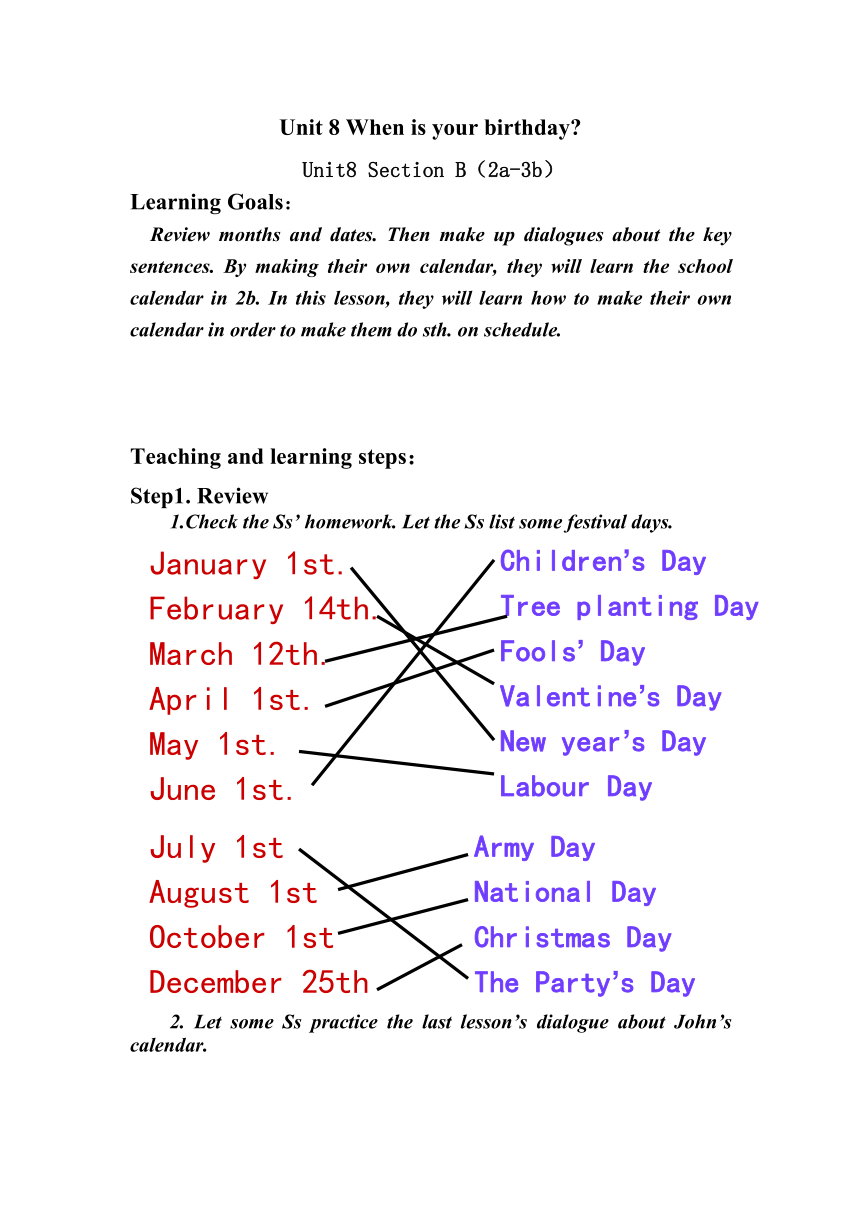 | |
| 格式 | zip | ||
| 文件大小 | 42.6KB | ||
| 资源类型 | 教案 | ||
| 版本资源 | 人教新目标(Go for it)版 | ||
| 科目 | 英语 | ||
| 更新时间 | 2013-04-05 22:03:14 | ||
图片预览

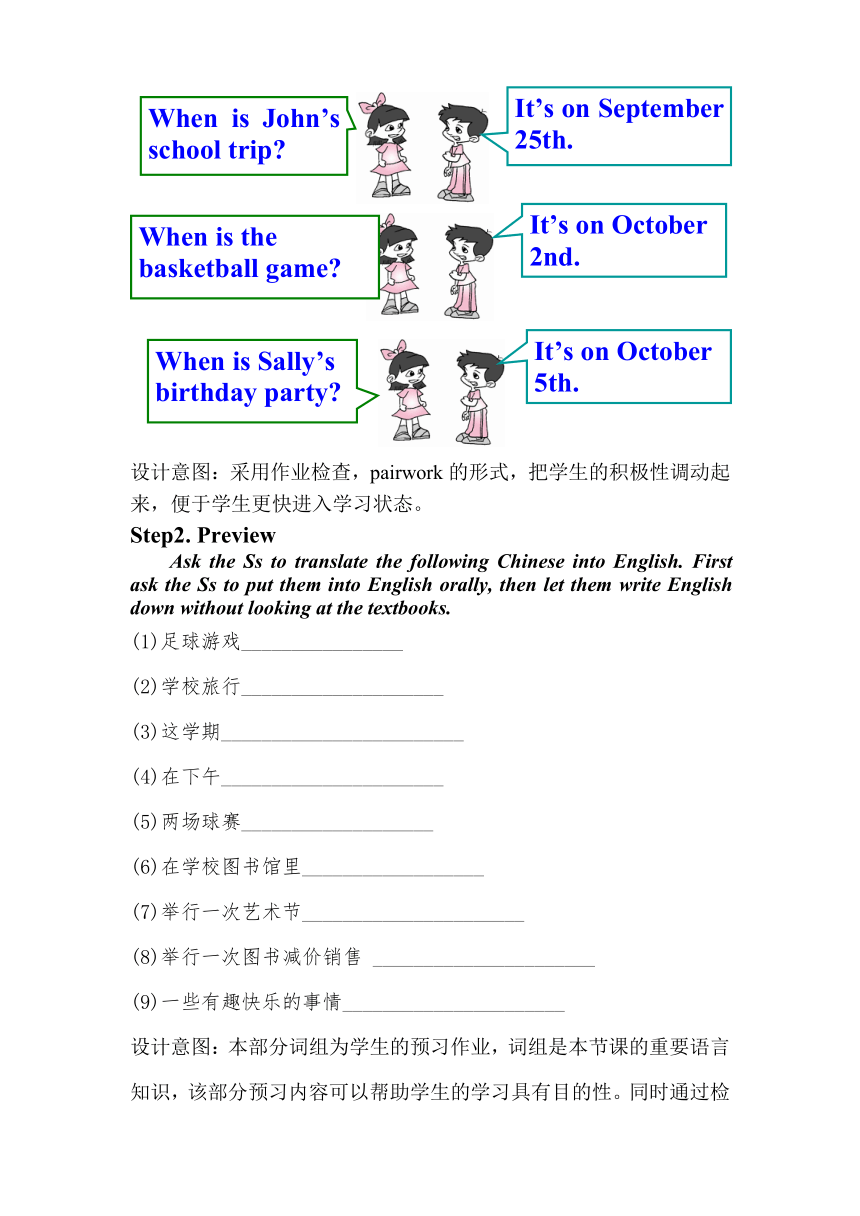
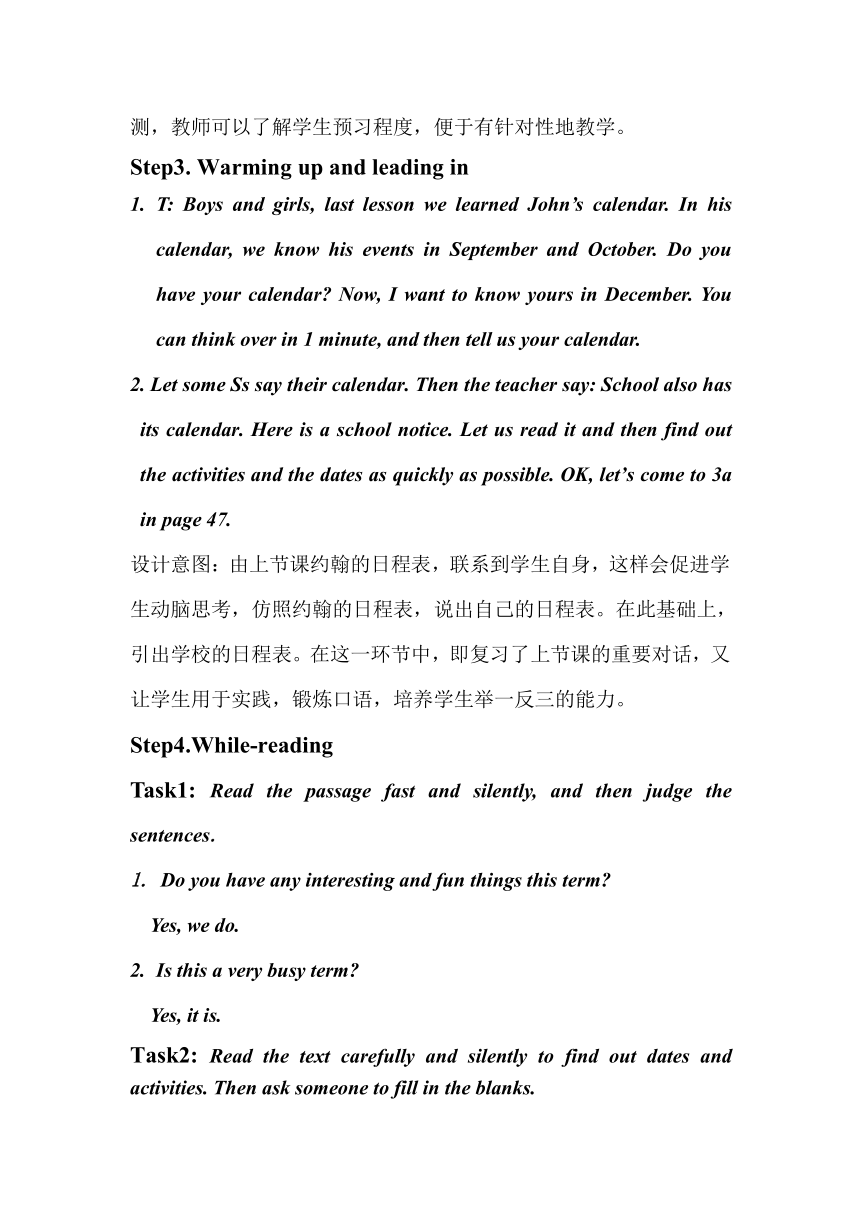
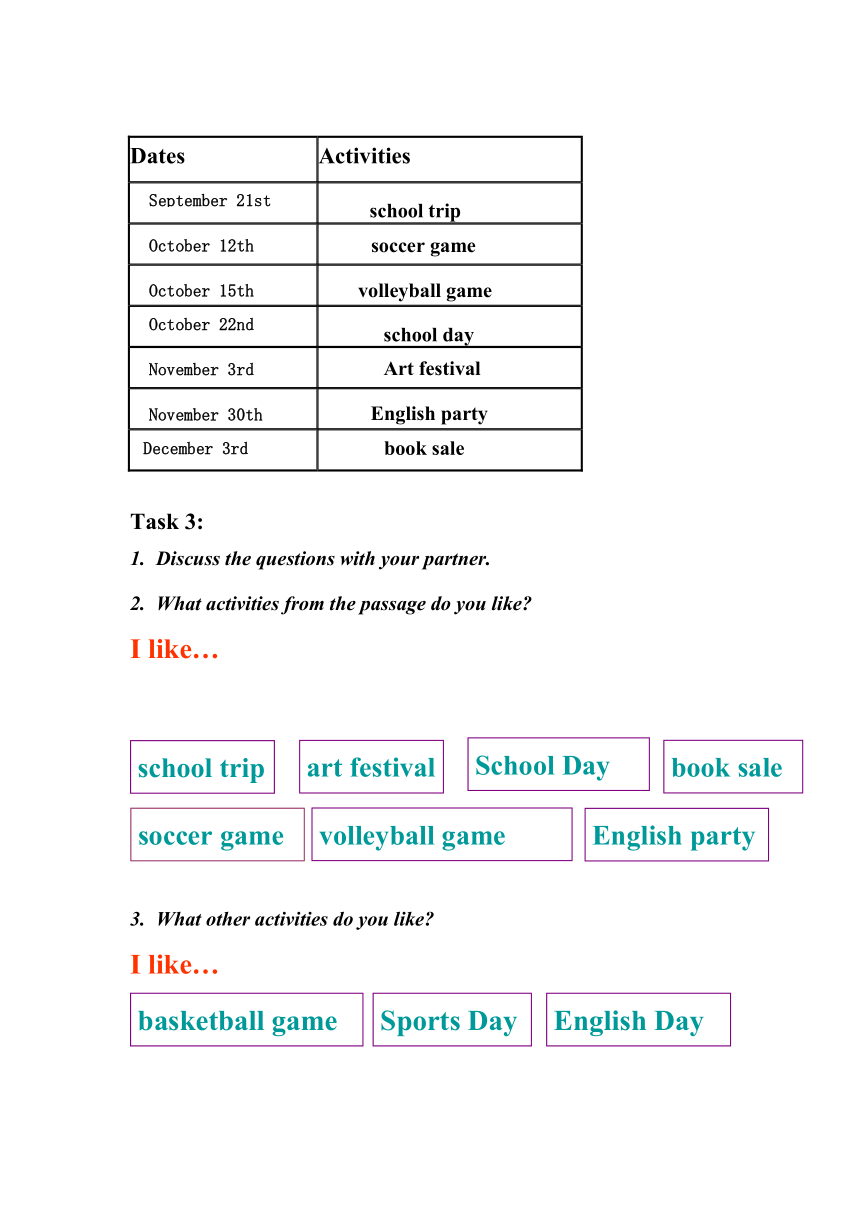
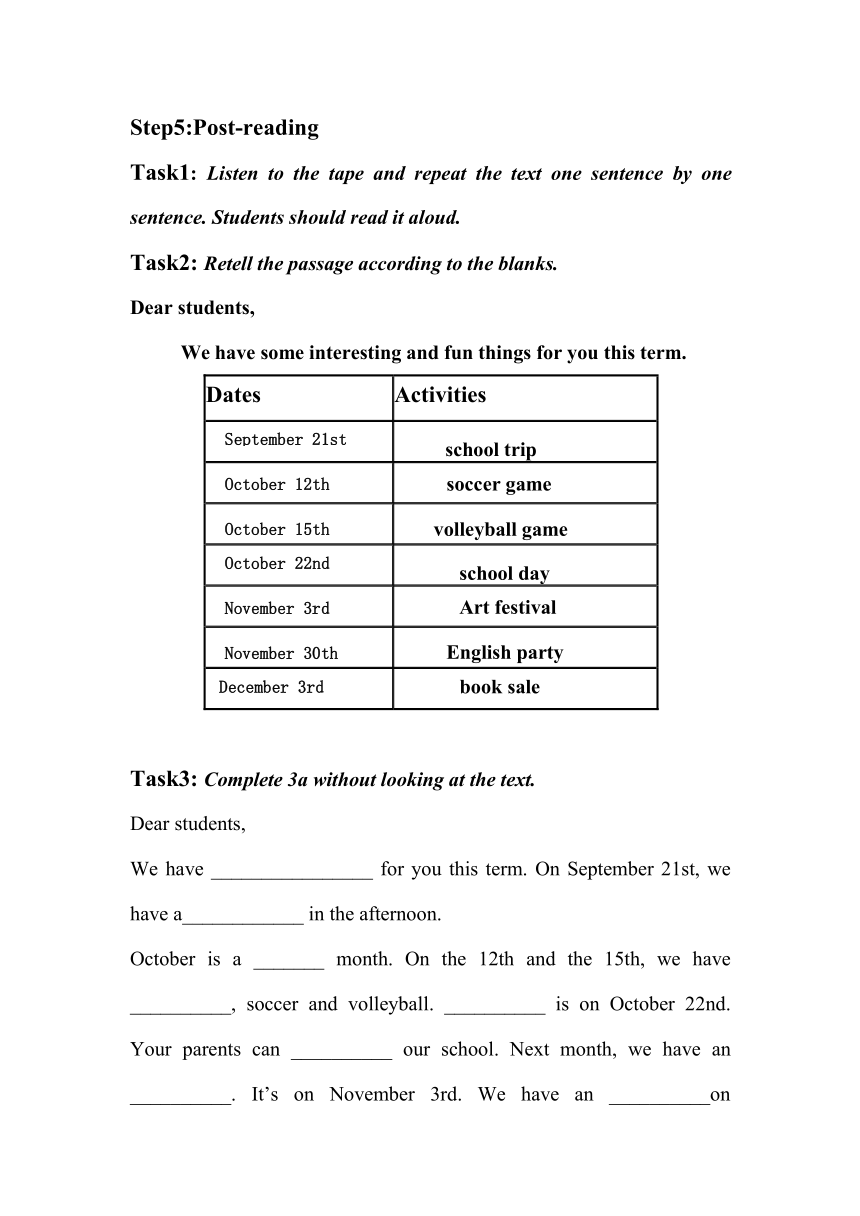
文档简介
Unit 8 When is your birthday?
Unit8 Section B(2a-3b)
Learning Goals:
Review months and dates. Then make up dialogues about the key sentences. By making their own calendar, they will learn the school calendar in 2b. In this lesson, they will learn how to make their own calendar in order to make them do sth. on schedule.
Teaching and learning steps:
Step1. Review
1.Check the Ss’ homework. Let the Ss list some festival days.
2. Let some Ss practice the last lesson’s dialogue about John’s calendar.
设计意图:采用作业检查,pairwork的形式,把学生的积极性调动起来,便于学生更快进入学习状态。
Step2. Preview
Ask the Ss to translate the following Chinese into English. First ask the Ss to put them into English orally, then let them write English down without looking at the textbooks.
(1)足球游戏________________
(2)学校旅行____________________
(3)这学期________________________
(4)在下午______________________
(5)两场球赛___________________
(6)在学校图书馆里__________________
(7)举行一次艺术节______________________
(8)举行一次图书减价销售 ______________________
(9)一些有趣快乐的事情______________________
设计意图:本部分词组为学生的预习作业,词组是本节课的重要语言知识,该部分预习内容可以帮助学生的学习具有目的性。同时通过检测,教师可以了解学生预习程度,便于有针对性地教学。
Step3. Warming up and leading in
T: Boys and girls, last lesson we learned John’s calendar. In his calendar, we know his events in September and October. Do you have your calendar? Now, I want to know yours in December. You can think over in 1 minute, and then tell us your calendar.
2. Let some Ss say their calendar. Then the teacher say: School also has its calendar. Here is a school notice. Let us read it and then find out the activities and the dates as quickly as possible. OK, let’s come to 3a in page 47.
设计意图:由上节课约翰的日程表,联系到学生自身,这样会促进学生动脑思考,仿照约翰的日程表,说出自己的日程表。在此基础上,引出学校的日程表。在这一环节中,即复习了上节课的重要对话,又让学生用于实践,锻炼口语,培养学生举一反三的能力。
Step4.While-reading
Task1: Read the passage fast and silently, and then judge the sentences.
1. Do you have any interesting and fun things this term?
Yes, we do.
Is this a very busy term?
Yes, it is.
Task2: Read the text carefully and silently to find out dates and activities. Then ask someone to fill in the blanks.
Dates
Activities
?
?
?
?
?
?
?
?
?
?
?
?
?
?
Task 3:
Discuss the questions with your partner.
What activities from the passage do you like?
I like…
What other activities do you like?
I like…
Step5:Post-reading
Task1: Listen to the tape and repeat the text one sentence by one sentence. Students should read it aloud.
Task2: Retell the passage according to the blanks.
Dear students,
We have some interesting and fun things for you this term.
Dates
Activities
?
?
?
?
?
?
?
?
?
?
?
?
?
?
Task3: Complete 3a without looking at the text.
Dear students,
We have ________________ for you this term. On September 21st, we have a____________ in the afternoon.
October is a _______ month. On the 12th and the 15th, we have __________, soccer and volleyball. __________ is on October 22nd. Your parents can __________ our school. Next month, we have an __________. It’s on November 3rd. We have an __________on November 30th. And on December 3rd, we have a book sale __________.
This is a really ______ term! Have a good time!
Task4: 3a.Complete the note with the words in the box.
Task5: 3b Write your own note to a friend. Invite him / her to an activity in your school. Use the questions to help you.
Using the following sentences, write down the passage.
1. Do you like (have) …?
2. Please come to …next week/this ….
3. We have a (an) …. It’s on …
4. On …, we have a(an) … in ….
5. See you there /Have a good time!
eg. Dear Jane,
Do you like English? Do you have an English book? Please come to the English party next week. On December 25th, we have an English party in our school library. See you there!
Jack
Step6.知识探究
Next month, we have an art festival. 下个月,我们举行艺术节。
1) month用作名词,意为“月;月份”,其复数形式为months,不可写为monthes。
There are twelve months in a year. 一年有十二个月。
2) have 表示“举行;举办”,后面跟表示活动的名词,指举办某种活动。如:
have a class meeting 开班会
have a music festival 举办音乐节
have tennis games 举办网球赛
have a book sale 举行减价售书活动
[归纳] have的其他用法:
(1) have有“有;拥有”之意。如:
I have three soccer balls, but my brother doesn’t. 我有三个足球,而我弟弟没有。
(2) have有“吃;喝”之意。如:
I usually have eggs and milk for breakfast. 早饭我通常吃鸡蛋,喝牛奶。
(3) have用于某些短语中,如:
have a look 看一看。
Step7. Exercises
1.根据句意及汉语提示写单词
(1) Today is Helen’s birthday. She wants to have a birthday_______ (聚会) at home.
(2) —Let’s go on a ____ (旅行) to the park.
—That sounds great!
(3) This term is really______ (忙碌).
2. 根据汉语提示完成句子
(1) 艺术节在九月九日举行。
The ___ _______ is on September 9th.
(2) 你们学校举行足球比赛吗?
Do you have a ______ ______ at your school?
(3) 祝你们愉快!
______ a good ______!
(4) 今天是我的第十二个生日。
Today is my ______ ________.
3.连词成句
(1) is, when, English, the, party (?)
___________________________________
(2) old, is, aunt, how, your (?)
___________________________________
(3) Jenny’s, trip, September, is, on, school, 27th (.)
___________________________________
(4) activity, in, have, you, what, school, do, your (?)
___________________________________
(5)really, is, term, that, a, busy (!)
___________________________________
Homework:
Write a passage about your school calendar. and retell the events to your parents.
教学反思:本课是一节关于学校日程的阅读课。通过前一节课的学习,我们学习了约翰的日程表,并在作业中,让学生实践写出了自己的日程表。这为本节课的学习打下了基础,学生理解起来较容易。在本课中,我仍然遵循“阅读前、阅读中、阅读后”三个环节展开教学。在阅读前,通过设置问题,检查学生预习情况,了解学生学习困难点。在阅读中,通过判断题,细节题等环节,多层次阅读课本,尽可能让学生全面理解文章内容及重点词块。在阅读后,让学生小组合作学习,练习对话等方式,力图达到巩固的作用。
课堂练习效果不是很好,时间显得过于紧促。如果学生的预习做到位,那么本节课的学习会轻松许多。与此同时,学生的课堂学习负担将会有所减轻。
keys:一、1. party 2.trip 3. busy
二.1. art festival 2.soccer game 3.Have; time 4. twelfth; birthday
三.1. When is the English party?
2. How old is your aunt?
3. Jenny’s school trip is on September 27th.
4. What activity do you have in your school?
5. That is a really busy term!
Unit8 Section B(2a-3b)
Learning Goals:
Review months and dates. Then make up dialogues about the key sentences. By making their own calendar, they will learn the school calendar in 2b. In this lesson, they will learn how to make their own calendar in order to make them do sth. on schedule.
Teaching and learning steps:
Step1. Review
1.Check the Ss’ homework. Let the Ss list some festival days.
2. Let some Ss practice the last lesson’s dialogue about John’s calendar.
设计意图:采用作业检查,pairwork的形式,把学生的积极性调动起来,便于学生更快进入学习状态。
Step2. Preview
Ask the Ss to translate the following Chinese into English. First ask the Ss to put them into English orally, then let them write English down without looking at the textbooks.
(1)足球游戏________________
(2)学校旅行____________________
(3)这学期________________________
(4)在下午______________________
(5)两场球赛___________________
(6)在学校图书馆里__________________
(7)举行一次艺术节______________________
(8)举行一次图书减价销售 ______________________
(9)一些有趣快乐的事情______________________
设计意图:本部分词组为学生的预习作业,词组是本节课的重要语言知识,该部分预习内容可以帮助学生的学习具有目的性。同时通过检测,教师可以了解学生预习程度,便于有针对性地教学。
Step3. Warming up and leading in
T: Boys and girls, last lesson we learned John’s calendar. In his calendar, we know his events in September and October. Do you have your calendar? Now, I want to know yours in December. You can think over in 1 minute, and then tell us your calendar.
2. Let some Ss say their calendar. Then the teacher say: School also has its calendar. Here is a school notice. Let us read it and then find out the activities and the dates as quickly as possible. OK, let’s come to 3a in page 47.
设计意图:由上节课约翰的日程表,联系到学生自身,这样会促进学生动脑思考,仿照约翰的日程表,说出自己的日程表。在此基础上,引出学校的日程表。在这一环节中,即复习了上节课的重要对话,又让学生用于实践,锻炼口语,培养学生举一反三的能力。
Step4.While-reading
Task1: Read the passage fast and silently, and then judge the sentences.
1. Do you have any interesting and fun things this term?
Yes, we do.
Is this a very busy term?
Yes, it is.
Task2: Read the text carefully and silently to find out dates and activities. Then ask someone to fill in the blanks.
Dates
Activities
?
?
?
?
?
?
?
?
?
?
?
?
?
?
Task 3:
Discuss the questions with your partner.
What activities from the passage do you like?
I like…
What other activities do you like?
I like…
Step5:Post-reading
Task1: Listen to the tape and repeat the text one sentence by one sentence. Students should read it aloud.
Task2: Retell the passage according to the blanks.
Dear students,
We have some interesting and fun things for you this term.
Dates
Activities
?
?
?
?
?
?
?
?
?
?
?
?
?
?
Task3: Complete 3a without looking at the text.
Dear students,
We have ________________ for you this term. On September 21st, we have a____________ in the afternoon.
October is a _______ month. On the 12th and the 15th, we have __________, soccer and volleyball. __________ is on October 22nd. Your parents can __________ our school. Next month, we have an __________. It’s on November 3rd. We have an __________on November 30th. And on December 3rd, we have a book sale __________.
This is a really ______ term! Have a good time!
Task4: 3a.Complete the note with the words in the box.
Task5: 3b Write your own note to a friend. Invite him / her to an activity in your school. Use the questions to help you.
Using the following sentences, write down the passage.
1. Do you like (have) …?
2. Please come to …next week/this ….
3. We have a (an) …. It’s on …
4. On …, we have a(an) … in ….
5. See you there /Have a good time!
eg. Dear Jane,
Do you like English? Do you have an English book? Please come to the English party next week. On December 25th, we have an English party in our school library. See you there!
Jack
Step6.知识探究
Next month, we have an art festival. 下个月,我们举行艺术节。
1) month用作名词,意为“月;月份”,其复数形式为months,不可写为monthes。
There are twelve months in a year. 一年有十二个月。
2) have 表示“举行;举办”,后面跟表示活动的名词,指举办某种活动。如:
have a class meeting 开班会
have a music festival 举办音乐节
have tennis games 举办网球赛
have a book sale 举行减价售书活动
[归纳] have的其他用法:
(1) have有“有;拥有”之意。如:
I have three soccer balls, but my brother doesn’t. 我有三个足球,而我弟弟没有。
(2) have有“吃;喝”之意。如:
I usually have eggs and milk for breakfast. 早饭我通常吃鸡蛋,喝牛奶。
(3) have用于某些短语中,如:
have a look 看一看。
Step7. Exercises
1.根据句意及汉语提示写单词
(1) Today is Helen’s birthday. She wants to have a birthday_______ (聚会) at home.
(2) —Let’s go on a ____ (旅行) to the park.
—That sounds great!
(3) This term is really______ (忙碌).
2. 根据汉语提示完成句子
(1) 艺术节在九月九日举行。
The ___ _______ is on September 9th.
(2) 你们学校举行足球比赛吗?
Do you have a ______ ______ at your school?
(3) 祝你们愉快!
______ a good ______!
(4) 今天是我的第十二个生日。
Today is my ______ ________.
3.连词成句
(1) is, when, English, the, party (?)
___________________________________
(2) old, is, aunt, how, your (?)
___________________________________
(3) Jenny’s, trip, September, is, on, school, 27th (.)
___________________________________
(4) activity, in, have, you, what, school, do, your (?)
___________________________________
(5)really, is, term, that, a, busy (!)
___________________________________
Homework:
Write a passage about your school calendar. and retell the events to your parents.
教学反思:本课是一节关于学校日程的阅读课。通过前一节课的学习,我们学习了约翰的日程表,并在作业中,让学生实践写出了自己的日程表。这为本节课的学习打下了基础,学生理解起来较容易。在本课中,我仍然遵循“阅读前、阅读中、阅读后”三个环节展开教学。在阅读前,通过设置问题,检查学生预习情况,了解学生学习困难点。在阅读中,通过判断题,细节题等环节,多层次阅读课本,尽可能让学生全面理解文章内容及重点词块。在阅读后,让学生小组合作学习,练习对话等方式,力图达到巩固的作用。
课堂练习效果不是很好,时间显得过于紧促。如果学生的预习做到位,那么本节课的学习会轻松许多。与此同时,学生的课堂学习负担将会有所减轻。
keys:一、1. party 2.trip 3. busy
二.1. art festival 2.soccer game 3.Have; time 4. twelfth; birthday
三.1. When is the English party?
2. How old is your aunt?
3. Jenny’s school trip is on September 27th.
4. What activity do you have in your school?
5. That is a really busy term!
同课章节目录
- starters 预备篇(2012秋审查)
- Unit 1 Good morning !
- Unit 2 What’s this in English?
- Unit 3 What color is it ?
- Unit 1 My name's Gina.
- Section A
- Section B
- Unit 2 This is my sister.
- Section A
- Section B
- Unit 3 Is this your pencil?
- Section A
- Section B
- Unit 4 Where's my schoolbag?
- Section A
- Section B
- Unit 5 Do you have a soccer ball?
- Section A
- Section B
- Unit 6 Do you like bananas?
- Section A
- Section B
- Unit 7 How much are these socks?
- Section A
- Section B
- Unit 8 When is your birthday?
- Section A
- Section B
- Unit 9 My favorite subject is science.
- Section A
- Section B
